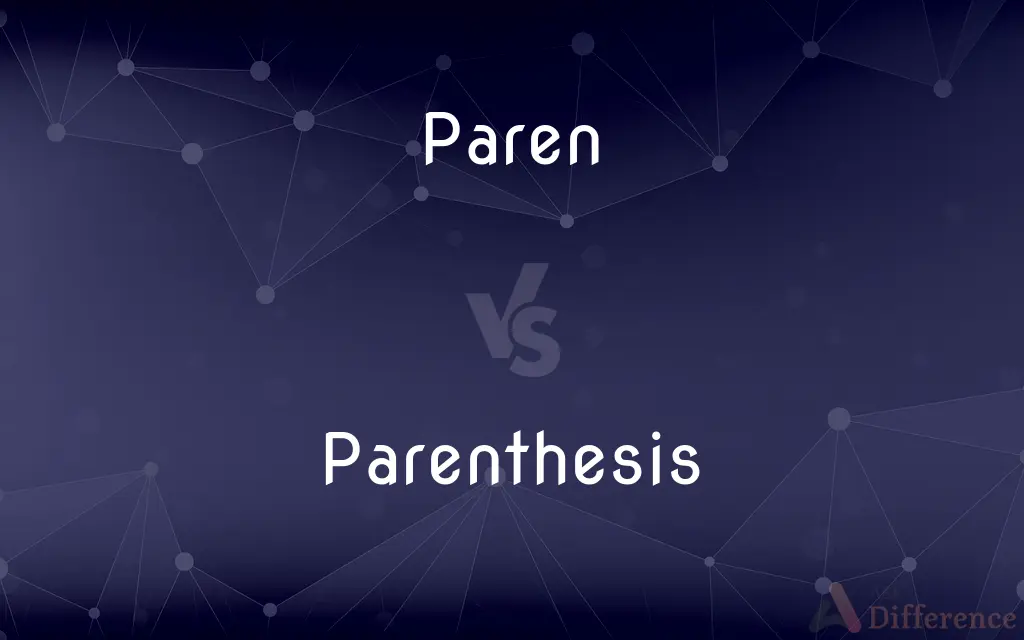Paren vs. Parenthesis — Which is Correct Spelling?
Edited by Maham Liaqat — By Sumaia Saeed — Updated on April 23, 2024
"Paren" is the incorrect spelling of "parenthesis." A parenthesis is a word, phrase, or clause inserted into a sentence to explain or modify it.

Table of Contents
Which is correct: Paren or Parenthesis
How to spell Parenthesis?

Paren
Incorrect Spelling

Parenthesis
Correct Spelling
ADVERTISEMENT
Key Differences
Remember that "parenthesis" contains the word "thesis" at the end, indicating something placed beside (which is its literal meaning).
The plural form is "parentheses," indicating the need for the full form "parenthesis" to correctly form its plural.
"Paren" is the incorrect spelling of "parenthesis." A parenthesis is a word, phrase, or clause inserted into a sentence to explain or modify it.
GPT
"Paren" lacks the necessary suffix "-thesis," which is essential for denoting the concept of additional or side information.
ADVERTISEMENT
Recall that "parenthesis" comes from a Greek word meaning to insert or interpose, hinting at a longer, more complex word.
How Do You Spell Parenthesis Correctly?
Incorrect: I found the paren to be unnecessary in his argument.
Correct: I found the parenthesis to be unnecessary in his argument.
Incorrect: The use of paren can make writing clearer.
Correct: The use of parenthesis can make writing clearer.
Incorrect: He added a paren at the end of the sentence to add more information.
Correct: He added a parenthesis at the end of the sentence to add more information.
Incorrect: Sometimes, a paren is just what you need to include extra details.
Correct: Sometimes, a parenthesis is just what you need to include extra details.
Parenthesis Definitions
The curved lines "(" and ")" used to mark off a word, phrase, or sentence as an aside.
The recipe ingredients were listed in parenthesis to ensure they were not overlooked.
A remark or passage that is inserted within a sentence but is not essential to its meaning.
He gave an example (a short, relevant one) to illustrate his point.
A digression in the course of a narrative or argument.
She often used parentheses in her stories, which added interesting asides.
A word or phrase inserted as an explanation or afterthought into a passage which is grammatically complete without it, in writing usually marked off by brackets, dashes, or commas
In a challenging parenthesis, Wordsworth comments on the evil effects of contemporary developments
An interlude or interval
The three months of coalition government were a lamentable political parenthesis
Either or both of the upright curved lines, ( ), used to mark off explanatory or qualifying remarks in writing or printing or enclose a sum, product, or other expression considered or treated as a collective entity in a mathematical operation.
A qualifying or amplifying word, phrase, or sentence inserted within written matter in such a way as to be independent of the surrounding grammatical structure.
A comment departing from the theme of discourse; a digression.
An interruption of continuity; an interval
"This is one of the things I wasn't prepared for—the amount of unfilled time, the long parentheses of nothing" (Margaret Atwood).
A clause, phrase or word which is inserted (usually for explanation or amplification) into a passage which is already grammatically complete, and usually marked off with brackets, commas or dashes.
Either of a pair of brackets, especially round brackets, ( and ) (used to enclose parenthetical material in a text).
(rhetoric) A digression; the use of such digressions.
Such brackets as used to clarify expressions by grouping those terms affected by a common operator, or to enclose the components of a vector or the elements of a matrix.
A word, phrase, or sentence, by way of comment or explanation, inserted in, or attached to, a sentence which would be grammatically complete without it. It is usually inclosed within curved lines (see def. 2 below), or dashes.
Don't suffer every occasional thought to carry you away into a long parenthesis.
One of the curved lines () which inclose a parenthetic word or phrase.
Either of two punctuation marks (or) used to enclose textual material
A message that departs from the main subject
The interjection of explanatory or qualifying words.
The weather was fine (luckily, as no one had brought an umbrella).
In mathematics, a pair of symbols used to group terms.
To solve the equation, first calculate the value inside the parenthesis.
Parenthesis Meaning in a Sentence
In math class, they learned how to solve problems using parenthesis effectively.
The use of parenthesis in his essay added depth to his arguments.
He always uses a parenthesis when he writes to add clarifying information.
A well-placed parenthesis can provide useful details without breaking the flow of the text.
Adding a parenthesis often helps clarify what would otherwise be a vague statement.
Sometimes, you need to read the parenthesis to get all the jokes in the book.
Teachers often use parenthesis to include additional explanations in their lectures.
While editing, she added a parenthesis to ensure clarity in the technical description.
The information inside the parenthesis was crucial for understanding the whole story.
She whispered a brief parenthesis during the meeting to suggest a better idea.
In the novel, the author uses a parenthesis to express the protagonist's inner thoughts.
Parenthesis usage in legal texts helps specify terms that have particular definitions.
When reading, he noted the parenthesis that contained historical facts.
The parenthesis in the article included a list of sources for further reading.
In written dialogues, a parenthesis can show what a character is thinking.
The poem used parenthesis to add a contrasting voice.
The playwright used a parenthesis to specify the actor’s movement on stage.
She found the critical comment hidden in a parenthesis in the document.
The parenthesis provided the necessary background to understand the context.
She reviewed the document for any unnecessary parenthesis that could be removed.
Parenthesis Idioms & Phrases
Closing parenthesis
The end or conclusion of an aside or additional comment.
With a closing parenthesis, she summarized her thoughts.
In parenthesis
When something is said as an aside or additional information.
He mentioned, in parenthesis, that the budget was still under review.
Living in parenthesis
Living in a state of being temporarily set aside from normal life.
She felt like she was living in parenthesis during her sabbatical.
Without parenthesis
Speaking or writing straightforwardly without additional comments.
He preferred to speak without parenthesis, getting straight to the point.
To draw a parenthesis
To create a distinction or boundary in discussion or text.
Let's draw a parenthesis around this issue and focus on more urgent matters.
Outside the parenthesis
Referring to information or issues that are not part of the current discussion.
We'll discuss those issues outside the parenthesis of today's meeting.
To close the parenthesis
To conclude an aside or additional explanation.
To close the parenthesis, she added that further tests were needed.
Opening parenthesis
The beginning of an insertion or aside within a conversation or text.
He started his explanation with an opening parenthesis about his background.
To put something in parenthesis
To make a comment or mention something as not entirely integral.
We can put that idea in parenthesis for now and return to it later.
To fall into parenthesis
To become less important or temporarily sidelined.
Her project fell into parenthesis during the reorganization.
Beyond the parenthesis
Referring to what lies outside the current topic or scope.
We need to look beyond the parenthesis and consider the bigger picture.
Common Curiosities
What is a stressed syllable in parenthesis?
The stressed syllable in "parenthesis" is the second one, "en."
Why is it called parenthesis?
It is called "parenthesis" because it derives from a Greek word meaning to insert or place alongside.
How do we divide parenthesis into syllables?
Parenthesis is divided as: par-en-the-sis.
How many syllables are in parenthesis?
"Parenthesis" has four syllables.
How is parenthesis used in a sentence?
A parenthesis is used to insert additional information into a sentence that can clarify or provide extra context.
What is the pronunciation of parenthesis?
Parenthesis is pronounced as /pəˈrɛnθɪsɪs/.
What is another term for parenthesis?
Another term for "parenthesis" is "insertion."
What is the singular form of parenthesis?
The singular form is "parenthesis."
Is parenthesis an abstract noun?
Yes, parenthesis is considered an abstract noun as it represents an idea or concept rather than a physical object.
Is the word parenthesis a Gerund?
No, "parenthesis" is not a gerund.
What is the verb form of parenthesis?
There is no verb form of "parenthesis;" however, the related verb might be "parenthesize."
What is the root word of parenthesis?
The root word of "parenthesis" is the Greek "parenthesis," meaning to put beside.
Is parenthesis a noun or adjective?
Parenthesis is a noun.
Is parenthesis an adverb?
No, parenthesis is not an adverb.
Is parenthesis a negative or positive word?
Parenthesis is a neutral word; it is neither inherently negative nor positive.
Is parenthesis a countable noun?
Yes, parenthesis is a countable noun.
Is the word parenthesis imperative?
No, "parenthesis" is not an imperative form.
What is the plural form of parenthesis?
The plural form is "parentheses."
What is the opposite of parenthesis?
There isn't a direct opposite of "parenthesis," but one could consider "main statement" or "core sentence" as conceptually opposite.
Is parenthesis a vowel or consonant?
The word "parenthesis" starts with a consonant.
Which preposition is used with parenthesis?
The preposition "in" is commonly used with "parenthesis" (e.g., in parenthesis).
What part of speech is parenthesis?
"Parenthesis" is a noun.
Is the parenthesis term a metaphor?
No, "parenthesis" is not typically used as a metaphor.
Is the word “parenthesis” a Direct object or an Indirect object?
"Parenthesis" can be used as a direct object in a sentence.
Which conjunction is used with parenthesis?
Conjunctions are not typically used directly with "parenthesis," but "and" can link sentences or clauses involving it.
Which article is used with parenthesis?
The indefinite article "a" or the definite article "the" can be used with "parenthesis" depending on the context.
Is parenthesis a collective noun?
No, parenthesis is not a collective noun.
Which determiner is used with parenthesis?
Determiners like "a," "the," or "this" can be used with "parenthesis."
Which vowel is used before parenthesis?
Typically, "a" is used before "parenthesis."
Share Your Discovery

Previous Comparison
Inadvertantly vs. Inadvertently
Next Comparison
Wholley vs. WhollyAuthor Spotlight
Written by
Sumaia SaeedEdited by
Maham Liaqat













































